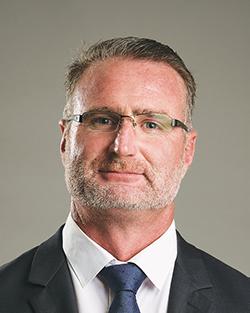
Shaune du Plessis, director of maintenance operations, discusses with James Pozzi how the cargo carrier is looking to bolster its maintenance offerings as its airline fleet grows.

What are some of the key elements of Texel Air’s maintenance strategy?
Texel Air remains focused on growing a sustainable maintenance organization in Bahrain, with emphasis on our own fleet and maintaining the highest level of operational readiness. We are always looking for opportunities to grow our capability and offerings to third-party customers. However, this is done methodically to ensure any growth or investment has a positive long-term return on investment. For all workscopes, we do a thorough capability assessment on the tasks required and provide in-depth feedback as to whether they can be done with our capability or not, considering our tooling, skills and resources. The focus is Bahrain and how we can foster synergies with other local or regional airlines in the future.
What effect has COVID-19 had on your operation, both positive and negative?
The positive is that we’ve had a steady growth in our airline and maintenance organization. We obtained our base maintenance approval under the Bahrain Civil Aviation Authority (BCAA) a few weeks before COVID, and we have been able to attract some high-class talent to join our team as larger historical airlines downsized and laid off highly skilled and motivated individuals, purely to cut costs. The negative impact on our operation has been the inconsistency of the supply chain of good quality line-replaceable units out of workshops and the high cost of shipping items with increased delays on aircraft-on-ground orders.
Last year, Texel Air took the world’s first Boeing 737-700 FlexCombi from Pemco. What are some of the unique technical tasks and challenges associated with this type of aircraft?
The aircraft is fundamentally built on the superb platform of the Boeing 737 Next Generation. Operationally, it is typical of this type of aircraft—reliable and trustworthy. The unique features of the FlexCombi conversion are primarily around the moveable barrier and interior, which allows it to “flex” between configurations. Our Texel Air maintenance team has had opportunity to disassemble and reassemble the configuration a couple of times with great success. This would be the most unique task and challenge on this very well-designed and executed product.
How is your maintenance team preparing for incoming aircraft orders?
Texel Air’s maintenance team has taken learnings from the previous deliveries and is steadily growing the team to support the extra aircraft that we plan to bring onboard. Texel Air ensures that the business remains lean to control costs but flexible enough to surge when needed. There is always a fine balance—no matter the size of the airline or fleet—between being over-resourced or under-resourced. COVID has shown how quickly the larger airlines have dropped the “fat” from their operations at crunch time and adopted a lean methodology. Texel Air had this methodology before COVID, with safety and compliance at the forefront of our decision-making around resourcing.
Are there plans for any expansions of Texel Air’s maintenance operation, both in terms of capacity and workforce?
Yes. We are currently evaluating the operation versus our growth strategy and determining the suitable increase in our workforce and—if needed—changes to our structure. We are in a fortunate position in that we have new executives who have been brought in to assist with our growth and strategy.
Texel Air has a multinational workforce. Bahrain is attractive for expats, but are there challenges about sourcing technical staff domestically? If so, what is Texel Air doing about this?
Bahrain is a small island kingdom, but [the country] has had years of exposure to aviation with very well-developed and educated aviators. Most of these [aviators] work for the national carrier and, yes, we as Texel Air have challenges with the experience and exposure to the Boeing 737 family of aircraft within Bahrain. The Texel Air maintenance team has picked up the baton on this and for the last four years has taken a proactive interest in assisting in developing our Bahraini employees. I am proud to say that since early this year, four of our Bahraini engineers now hold [European Union Aviation Safety Agency] B1 aircraft maintenance licenses with 737 endorsements. We continue to assist and develop the others and are looking proactively at other young talent in the kingdom to join our team.
What investments in IT and other technology are you prioritizing?
ETOPS approval, E-Tech log and maintenance management service implementation.
What is the ratio of maintenance work insourced and outsourced by the airline?
We are largely line- and base-maintenance-task-focused using Maintenance Steering Group-3 methodology to execute out-of-phase maintenance. Larger check packs are outsourced. The largest percentage of work is accomplished by us in Bahrain in our facility [at Bahrain International Airport.]
Does Texel Air undertake MRO work for third parties?
We support business jets and other ad hoc requests for maintenance assistance from airlines transiting through Bahrain. We are heavily focused on 737 aircraft, so this is typically what we would support as a business. Post-COVID and depending on our own airline’s growth, [Airbus] A320 work could become more of a focus as the aviation business comes back online.
Texel Air Fact File
Headquarters: Samaheej, Bahrain
History: Founded in 2013 by aviation entrepreneur John Chisholm, Texel Air commenced operation the following year in 2014 and operates a facility from Bahrain International Airport.
Fleet: Four aircraft, including one Boeing 737-300F and two 737-700FCs. One 737-800BCF is due in December 2021 and another is scheduled for delivery in July 2022.
MRO Capabilities: Texel Air holds EASA line maintenance approval for Boeing 737 Classic (CL) and Next-Generation (NG) variants, along with Airbus A320 aircraft. It also holds a BCAA line maintenance approval for the 737CL, NG and A320 along with a BCAA base maintenance approval for the 737CL and NG. “Our primary focus is line maintenance services and tasks for now,” du Plessis says. “This does not mean that a more complete base maintenance solution in the near-term is not a possibility.”

